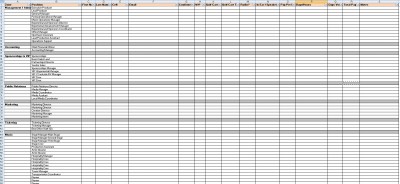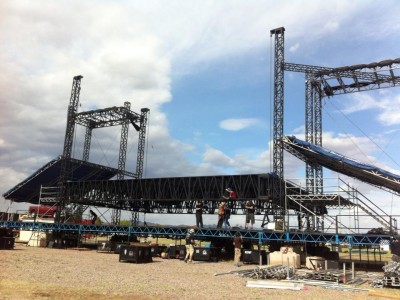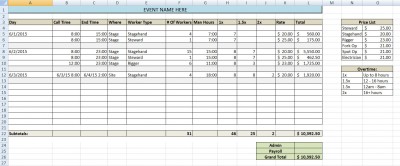Staffing and Labor Guide
Staffing Guide
Staffing is one of the most important aspects of all festivals and events – after all, without the proper staffing levels and skill sets, your event will not likely succeed.
Below is a list of all major staffing positions and who reports to who:
- Determine your advance and run of show staffing needs
- This is based on the size of your event and how much you need to outsource vs. utilizing internal company help or doing yourself.
- Pay for these kind of roles usually falls under a day rate, but it’s not uncommon to pay a flat event rate as well. Estimated pay ranges are included for the roles below, based on the scope of work, size of the event, hours expected to work, and elements you’re working in (i.e., extreme weather).
- General List of Event / Festival Staff (smaller events will not need all of these):
- Festival / Event Director – $500 – $750+ / day
- Site Manager – $300 to $600 / day
- Site Crew – $200 – $300 / day
- Signage Team
- Build / Strike Team
- Site Crew – $200 – $300 / day
- Production Manager – $300 – $600 / day
- Production Assistant – $250 – $300 / day
- Stage Manager – $250 – $500 / day
- Labor Manager – $250 – $400 / day
- Stage Crew – $150 – $250 / day
- Security Manager – $300 – $600 / day
- VIP Manager – $300 – $400 / day
- VIP Coordinators – $200 – $300 / day
- Hospitality Manager – $300 – $400 / day
- Hospitality Coordinators – $200 – $300 / day
- Sponsorship Manager – $300 – $400 / day
- Media Manager – $300 – $400 / day
- Social Media Coordinator – $200 – $300 / day
- Photographer – $200+ per day
- Food Vendor Manager – $300 – $500 / day
- Art Vendor Manager – $300 – $500 / day
- Non-Profit Manager – $300 – $500 / day
- Parking Manager – $300 – $500 / day
- Front of House / Crowd Control Manager – $300 – $500 / day
- Camping Manager – $300 – $500 / day
- Office Manager– $250 – $400 / day
- Festival Manager – $250 – $500 / day
- Box Office Manager – $250 – $500 / day
- Box Office Team – $150 – $200 / day
- Artist Relations Manager – $250 – $400 / day
- Transportation Team – $200 – $300 / day
- Artist Relations Coordinators – $150 – $250 / day
- Site Manager – $300 to $600 / day
- Festival / Event Director – $500 – $750+ / day
- Compile a Staffing Grid – download .xls version here

- Compile a Staff / Vendor Catering Grid – don’t forget to feed your staff – download .xls version here

- Look to either outsource a turnkey staffing company or source individually
- Outsourcing a staffing company will come with a higher overhead cost but it can also let you consolidate your needs in one place, and perhaps with all highly-skilled, professional members. But if there are weak links once the event begins, it’s often too difficult to replace at the last minute.
- Sourcing individually allows you the flexibility to plug in your most desired personnel in key positions, and it can save you in some overhead costs. It will take longer on the admin / contracting side.
- Be sure to ask for and review feedback from your staff.
- It’s important for their voices to be heard as well as they will often catch issues management may not see. It’s also important to recognize extraordinary performers and achievements.
- Download our event and festival staff feedback template to use as a guide.
Labor Guide
- For stagehand, production, and/or site related labor, determine if it needs to be union / non-union
- Determine if your state is right-to-work or a forced-unionism state
- Union Labor Details:
- Most Common Unions for Events and Festivals:
 IASTE – The International Alliance of Theatrical Stage Employees, Moving Picture Technicians, Artists and Allied Crafts of the United States, Its Territories and Canada was founded in 1893 when representatives of stagehands working in eleven cities met in New York and pledged to support each others’ efforts to establish fair wages and working conditions for their members.
IASTE – The International Alliance of Theatrical Stage Employees, Moving Picture Technicians, Artists and Allied Crafts of the United States, Its Territories and Canada was founded in 1893 when representatives of stagehands working in eleven cities met in New York and pledged to support each others’ efforts to establish fair wages and working conditions for their members.
 Teamsters – The Teamsters are known as the champion of freight drivers and warehouse workers, but have organized workers in virtually every occupation imaginable, both professional and non-professional, private sector and public sector.
Teamsters – The Teamsters are known as the champion of freight drivers and warehouse workers, but have organized workers in virtually every occupation imaginable, both professional and non-professional, private sector and public sector.
- Stagehand labor usually includes:
- loaders/pushers – those who take care of moving around road cases and other gear
- riggers – those who climb up and rig points to hang PA, lighting, truss, and other flown equipment
- spot ops – those who operate follow spots for the event’s performers
- fork ops – those who operate heavy machinery like forklifts
- carpenters – for events that need custom wood pieces created
- electricians – help ensure vendors / artists are properly tied into the house electrical system
- stewards – also known as a crew chief, oversee the various roles above
 Stage Crew Building the Main Stage at Country Thunder, 2013
Stage Crew Building the Main Stage at Country Thunder, 2013
- Most Common Unions for Events and Festivals:
- Breaks / meals have to be determined.
- Normal rule of thumb is one meal every five hours; either a half hour on-site with meals provided or a one hour walk away with no meal provided. For union labor, there may be a strict rule regarding this; you will want to confirm and ensure they are properly accommodated.
- For larger events, it usually makes sense to provide all labor with catering meal tickets and stagger their breaks so there are no major gaps in work. The Labor Manager normally oversees this and also ensures that the vendors the labor are working for are also coordinated with their breaks so no labor is left sitting idle.
- Make a stagehand labor grid and advance it with all affected departments. Below is an example with formulas – download the Excel version here.
- Ensure all labor has the proper documentation (W9s, W2s, waivers, NDAs, etc) prior to arriving on-site to ensure their eligibility to work and ability to get paid afterward
- View the IRS rules for paying artists / vendors that are not based in the United States
- Download the latest W9 here



